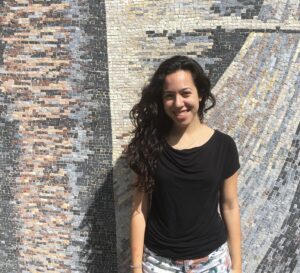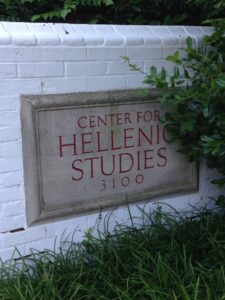 Before I arrived at the CHS at the beginning of this summer, I had never before experienced such a vibrant and welcoming Classics community. But after lugging my suitcases up the hill, snapping a photo of the “Iliad” license plate on the CHS’s Honda Odyssey, and receiving a warm greeting along with the key to my room, I immediately felt like I was a part of this wonderful place.
Before I arrived at the CHS at the beginning of this summer, I had never before experienced such a vibrant and welcoming Classics community. But after lugging my suitcases up the hill, snapping a photo of the “Iliad” license plate on the CHS’s Honda Odyssey, and receiving a warm greeting along with the key to my room, I immediately felt like I was a part of this wonderful place.
My home university’s Classics program is tiny, with only a handful of students and not much in the way of library resources. In order to work on writing my thesis or conduct any major research, I often have to pack up my notebooks and drive across town to other local universities, where I work as a visiting student researcher. It can be frustrating and time-consuming to sit in 40 minutes of traffic only to find that another library’s book is ultimately not helpful at all, or that it’s on reserve and I can’t check it out. And I’m certainly far from the only student who tries to make do with limited resources—other students have far less than I do. This is why the work that I applied to do at the CHS is so important to me, and at the time that I applied, I didn’t even realize to what an extent the work would open doors, far beyond what I’d even imagined.
Together with my fellow interns and partners-in-Classics, I worked on preparing a massive database called the First Thousand Years of Greek, a project which I learned spans multiple universities and institutions within the U.S. and abroad, with dozens of brilliant minds committed to crafting a collection of ancient Greek texts which will be online and open-access to all. With plenty of patient instruction from our supervisors at the CHS and in Leipzig, Germany, we learned to use XML (extensible markup language) to prepare dozens of texts for online publication—everything from Galen to Aesop to Theophrastus. We also corrected scans of other books which would also be published online for free, and helped train a computer to annotate some of the CHS’s existing online publications to make them more searchable. And we were even consulted about the creation of an incredible website which will soon house the First Thousand Years of Greek corpus in such a way that the entire collection can be searched and organized in multiple different ways, dependent upon each researcher’s unique needs.
 But even beyond our work to make Classics more accessible to the world, the CHS worked to make Classics more accessible to me as an intern. I was able to check out stacks upon stacks of books to further my own research as I wrote my Honors thesis, and was welcome to attend the sessions of any workshops held on campus for the entirety of the summer. I learned about perceptions of the human body during the Sunoikisis seminar, and I learned how to read Homeric scholia and watched as the first digital edition of the Venetus A manuscript neared its completion during the Homer Multitext Seminar. I found an indispensable research tool in discovering how to use Zotero during the Information Fluency Workshop, and over the course of the entire summer, I was able to talk with professors and students from all around the world about their experiences and their work in Classics. I made the most of my time in D.C., too, taking a class across town at Catholic University of America, attending public lectures at Dumbarton Oaks, working in the reading room at the Library of Congress, and running many humid, sweaty miles through Rock Creek Park.
But even beyond our work to make Classics more accessible to the world, the CHS worked to make Classics more accessible to me as an intern. I was able to check out stacks upon stacks of books to further my own research as I wrote my Honors thesis, and was welcome to attend the sessions of any workshops held on campus for the entirety of the summer. I learned about perceptions of the human body during the Sunoikisis seminar, and I learned how to read Homeric scholia and watched as the first digital edition of the Venetus A manuscript neared its completion during the Homer Multitext Seminar. I found an indispensable research tool in discovering how to use Zotero during the Information Fluency Workshop, and over the course of the entire summer, I was able to talk with professors and students from all around the world about their experiences and their work in Classics. I made the most of my time in D.C., too, taking a class across town at Catholic University of America, attending public lectures at Dumbarton Oaks, working in the reading room at the Library of Congress, and running many humid, sweaty miles through Rock Creek Park.
My experiences over the past two months at the CHS have allowed me to develop new skills and to contribute to tools that will allow my peers back home to have the same access to crucial research tools as any other students or professionals from larger and more well-funded universities, thus removing at least one obstacle for their academic success. Additionally, I feel that I have been able to learn something of value from each and every individual I have met on this campus, and I feel more prepared than ever for what I hope will be a long and fruitful career in Classics. I am eternally grateful for the support and enthusiasm especially of Allie Marbry, Lanah Koelle, Lenny Muellner, Greg Nagy, Matt Munson, Dan Cline, Lia Hanhardt, and Emily Kohut, as well as for all the work and fun that I shared with Pria Jackson and Brittany Hardy. And I am thankful to Joel Christensen, whose recommendation two years ago that I consider applying for an internship at some mystical, far-off place called the CHS has led to one of the most exciting and valuable opportunities of my life thus far.
